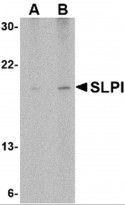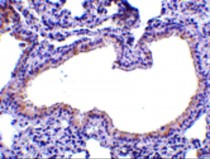ARG55109
anti-SLPI antibody
anti-SLPI antibody for ELISA,IHC-Formalin-fixed paraffin-embedded sections,Western blot and Human,Mouse
Cell Biology and Cellular Response antibody; Immune System antibody
Overview
| Product Description | Rabbit Polyclonal antibody recognizes SLPI |
|---|---|
| Tested Reactivity | Hu, Ms |
| Tested Application | ELISA, IHC-P, WB |
| Host | Rabbit |
| Clonality | Polyclonal |
| Isotype | IgG |
| Target Name | SLPI |
| Antigen Species | Human |
| Immunogen | Synthetic peptide (17 aa) within aa. 60-110 of Human SLPI. |
| Conjugation | Un-conjugated |
| Alternate Names | HUSI-1; Antileukoproteinase; WAP4; Protease inhibitor WAP4; ALK1; WAP four-disulfide core domain protein 4; BLPI; MPI; HUSI; Secretory leukocyte protease inhibitor; Seminal proteinase inhibitor; Mucus proteinase inhibitor; HUSI-I; WFDC4; ALP |
Application Instructions
| Application Suggestion |
|
||||||||
|---|---|---|---|---|---|---|---|---|---|
| Application Note | * The dilutions indicate recommended starting dilutions and the optimal dilutions or concentrations should be determined by the scientist. | ||||||||
| Positive Control | Daudi Cell Lysate |
Properties
| Form | Liquid |
|---|---|
| Purification | Affinity purification with immunogen. |
| Buffer | PBS and 0.02% Sodium azide |
| Preservative | 0.02% Sodium azide |
| Concentration | 1 mg/ml |
| Storage Instruction | For continuous use, store undiluted antibody at 2-8°C for up to a week. For long-term storage, aliquot and store at -20°C or below. Storage in frost free freezers is not recommended. Avoid repeated freeze/thaw cycles. Suggest spin the vial prior to opening. The antibody solution should be gently mixed before use. |
| Note | For laboratory research only, not for drug, diagnostic or other use. |
Bioinformation
| Database Links | |
|---|---|
| Gene Symbol | SLPI |
| Gene Full Name | secretory leukocyte peptidase inhibitor |
| Background | SLPI Antibody: Secretory leukocyte protease inhibitor (SLPI) is produced at mucosal surfaces, primarily the upper respiratory tract and is thought to play an important role in the antiprotease defense mechanism of the lung. SLPI forms inhibitory complexes with numerous proteolytic enzymes such as neutrophil elastase, and has been shown to possess anti-inflammatory, anti-viral, and antibacterial activities. Its expression in oral epithelial cells is stimulated by HIV-1 gp120, suggesting that SLPI is a component of the oral mucosal response to HIV-1. In peripheral blood monocytes, SLPI can inhibit NF-κB activation by inhibiting IκB degradation in the cytoplasm and competing for NF-κB binding sites in the nucleus. This attenuation of the inflammatory response may also act to suppress liver metastases and other cancer cell invasions, but promote blood-borne metastasis via an invasion-independent pathway. |
| Function | Acid-stable proteinase inhibitor with strong affinities for trypsin, chymotrypsin, elastase, and cathepsin G. May prevent elastase-mediated damage to oral and possibly other mucosal tissues. [UniProt] |
| Research Area | Cell Biology and Cellular Response antibody; Immune System antibody |
| Calculated MW | 14 kDa |
Images (2) Click the Picture to Zoom In







